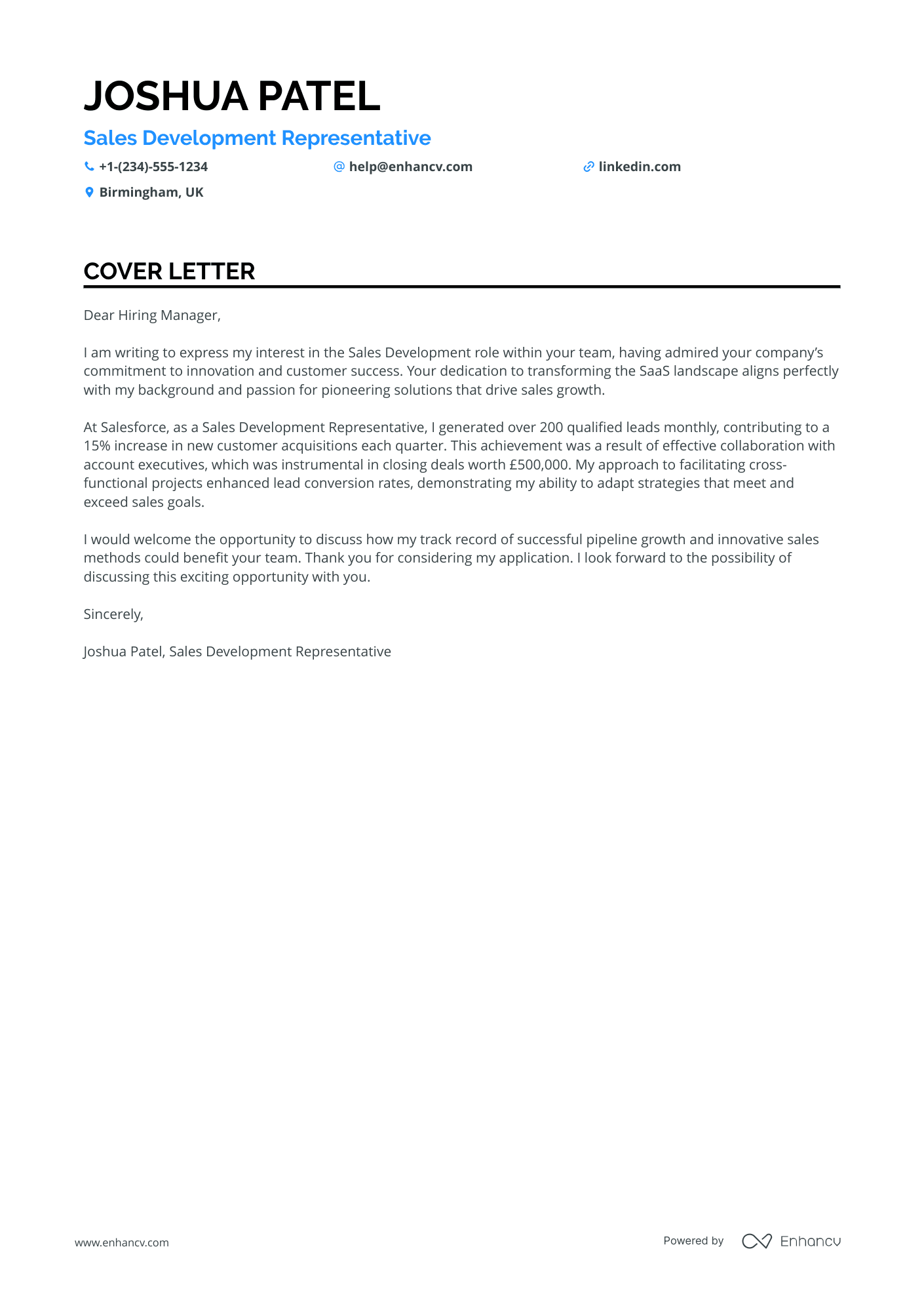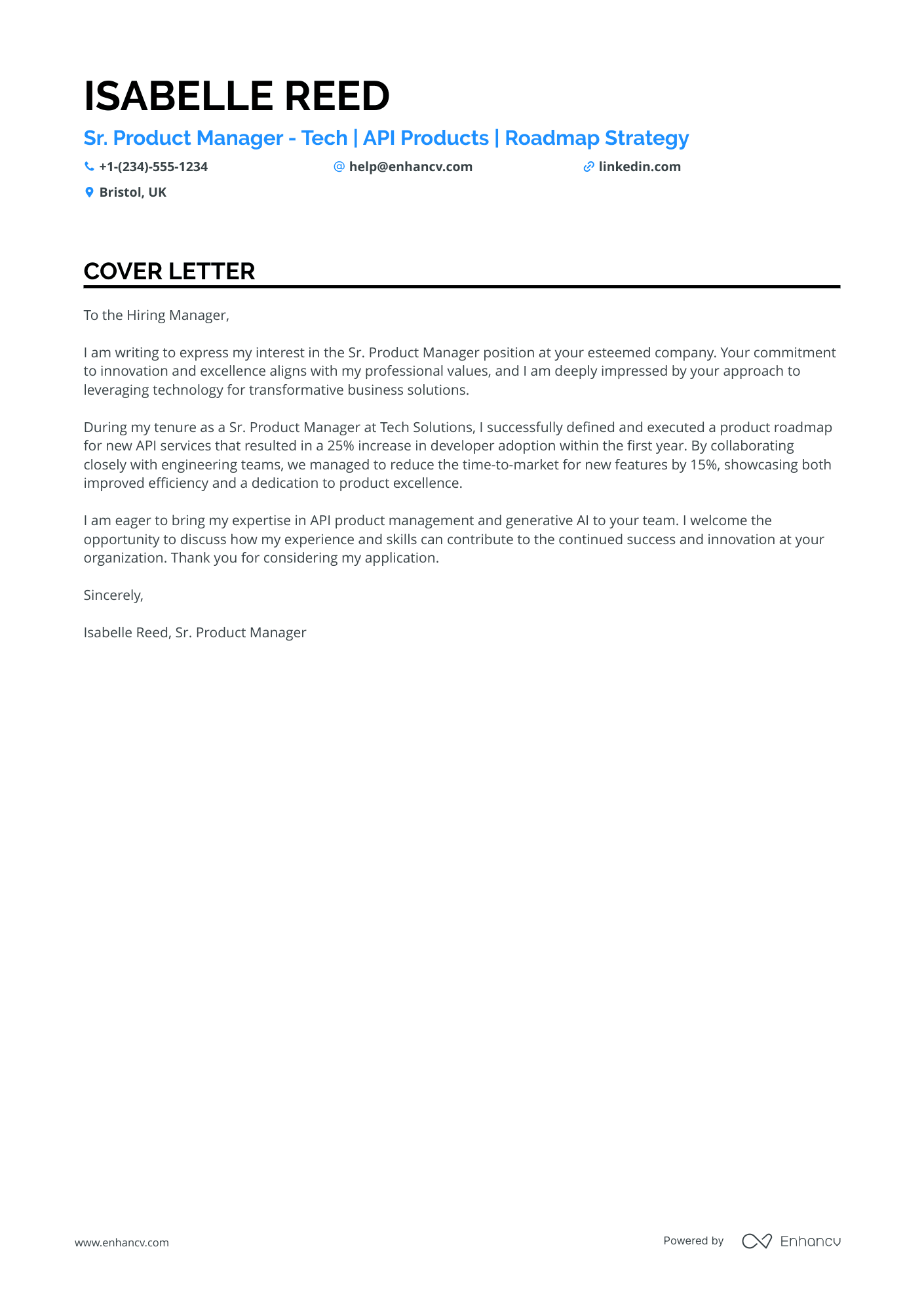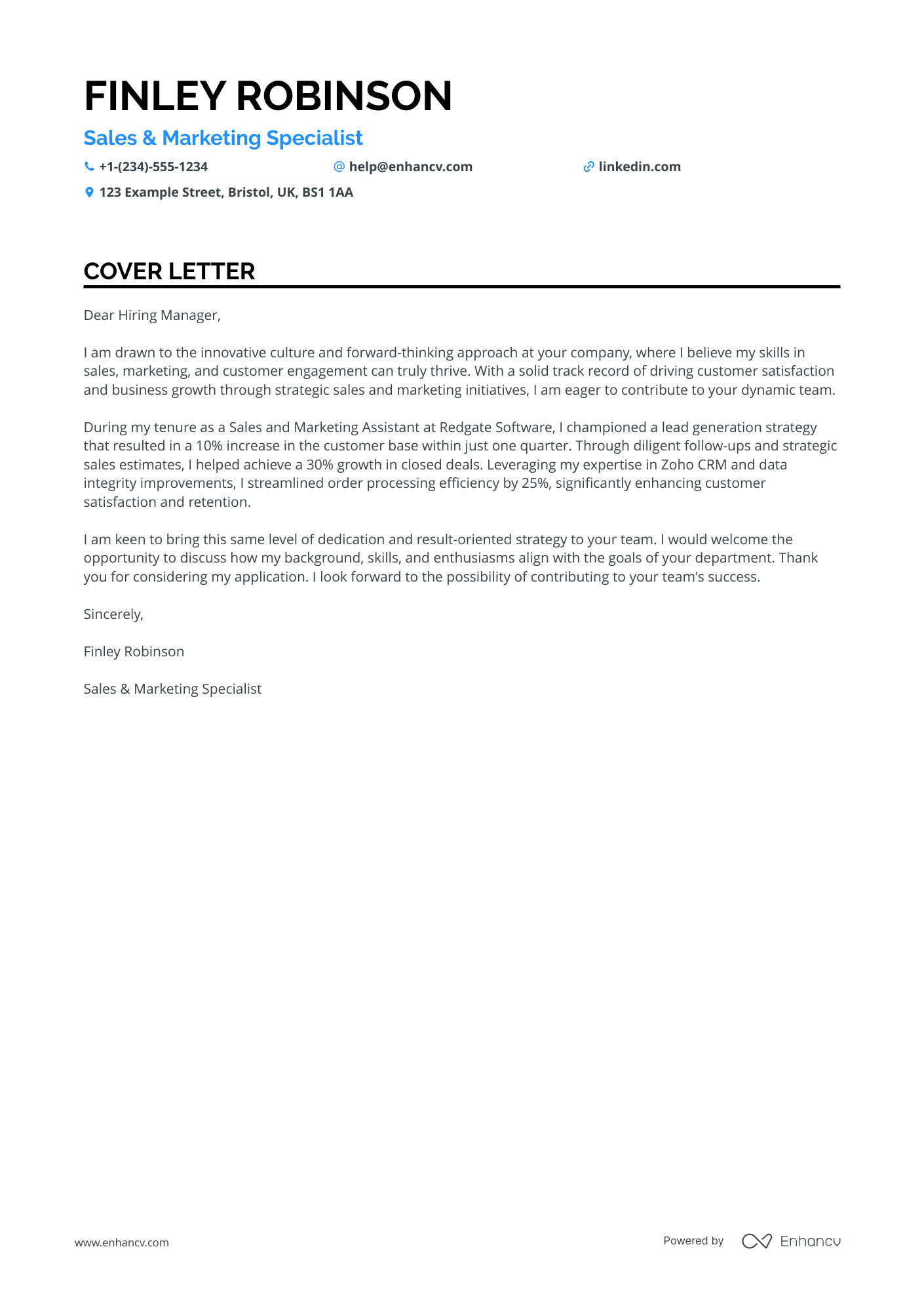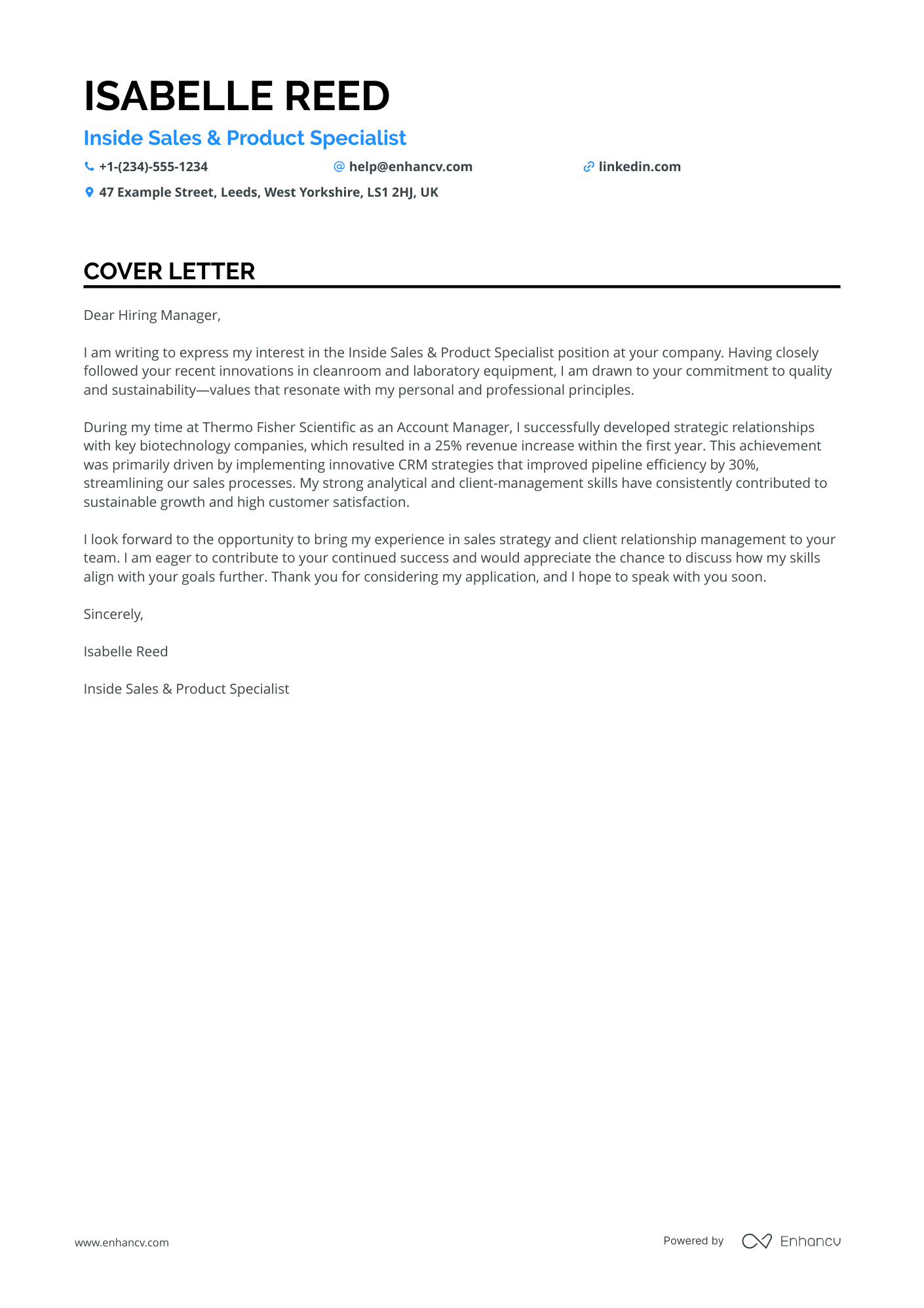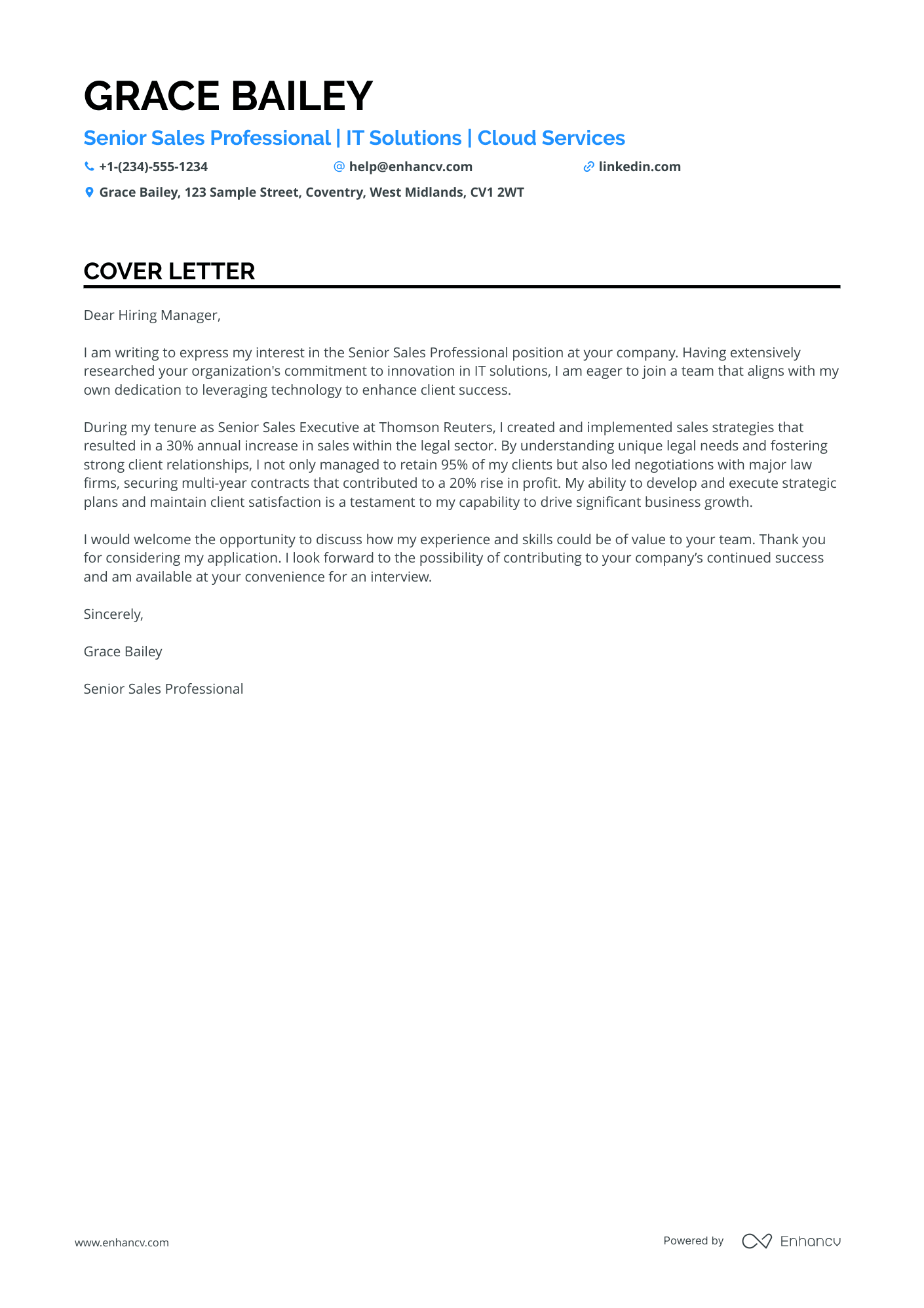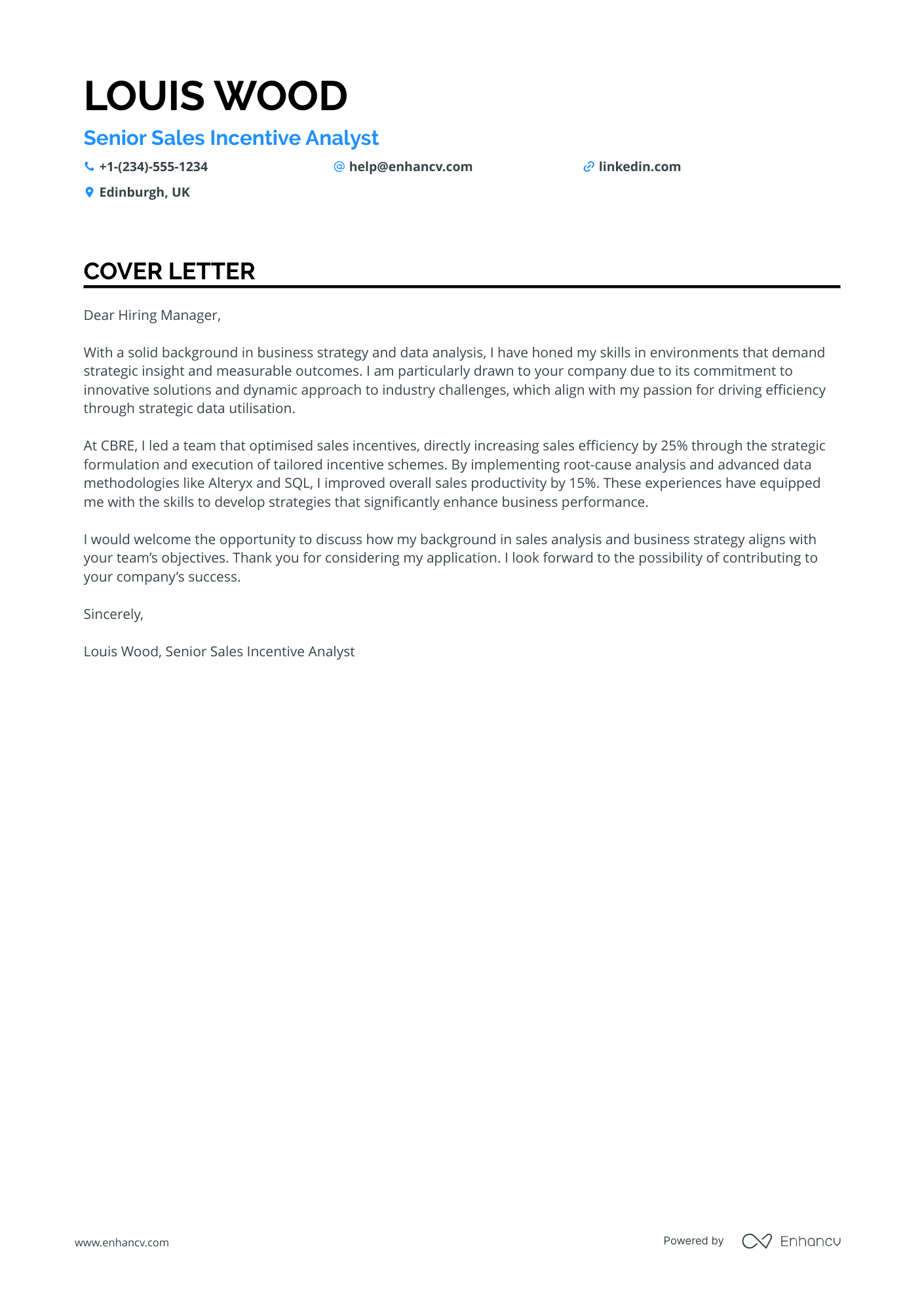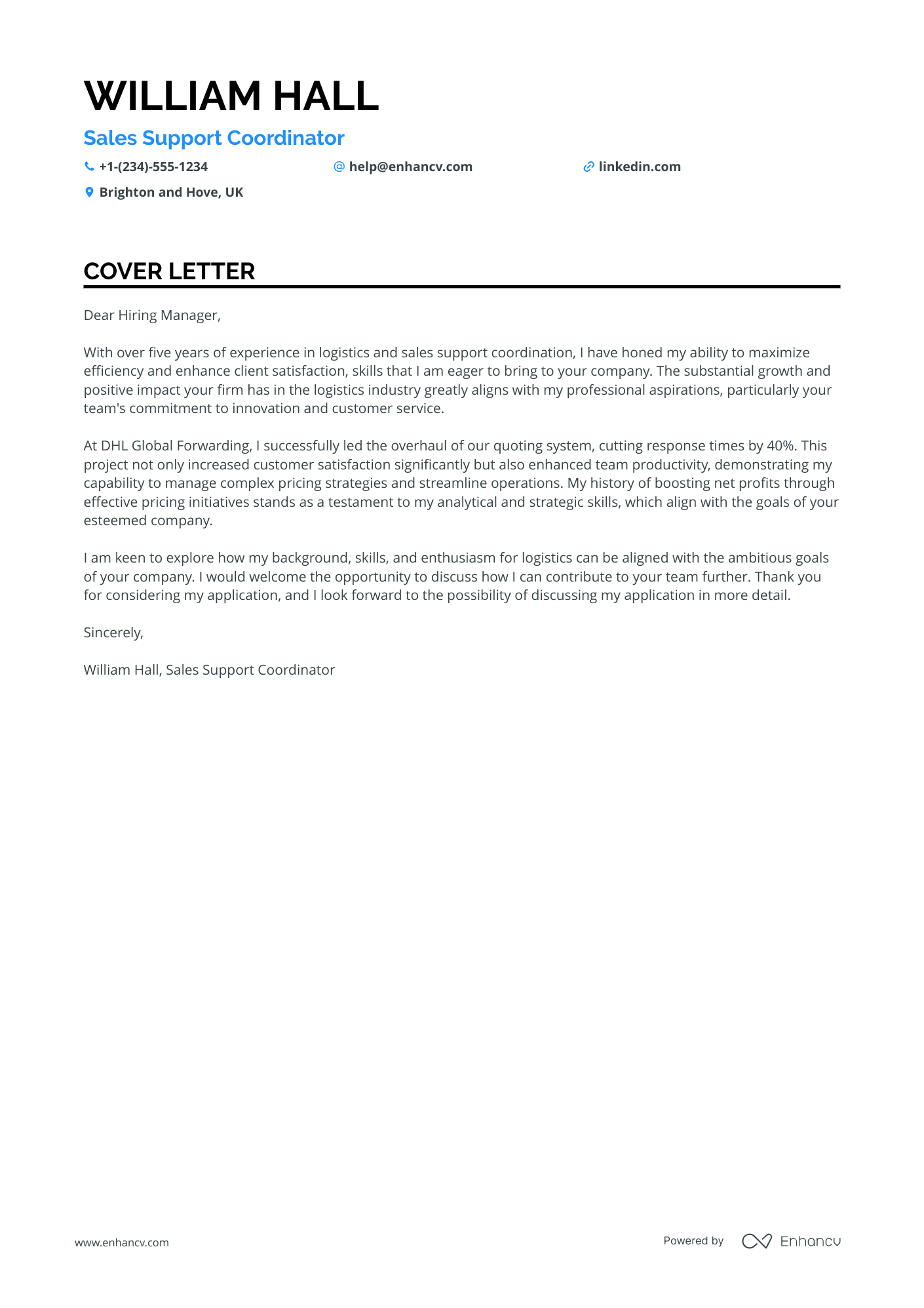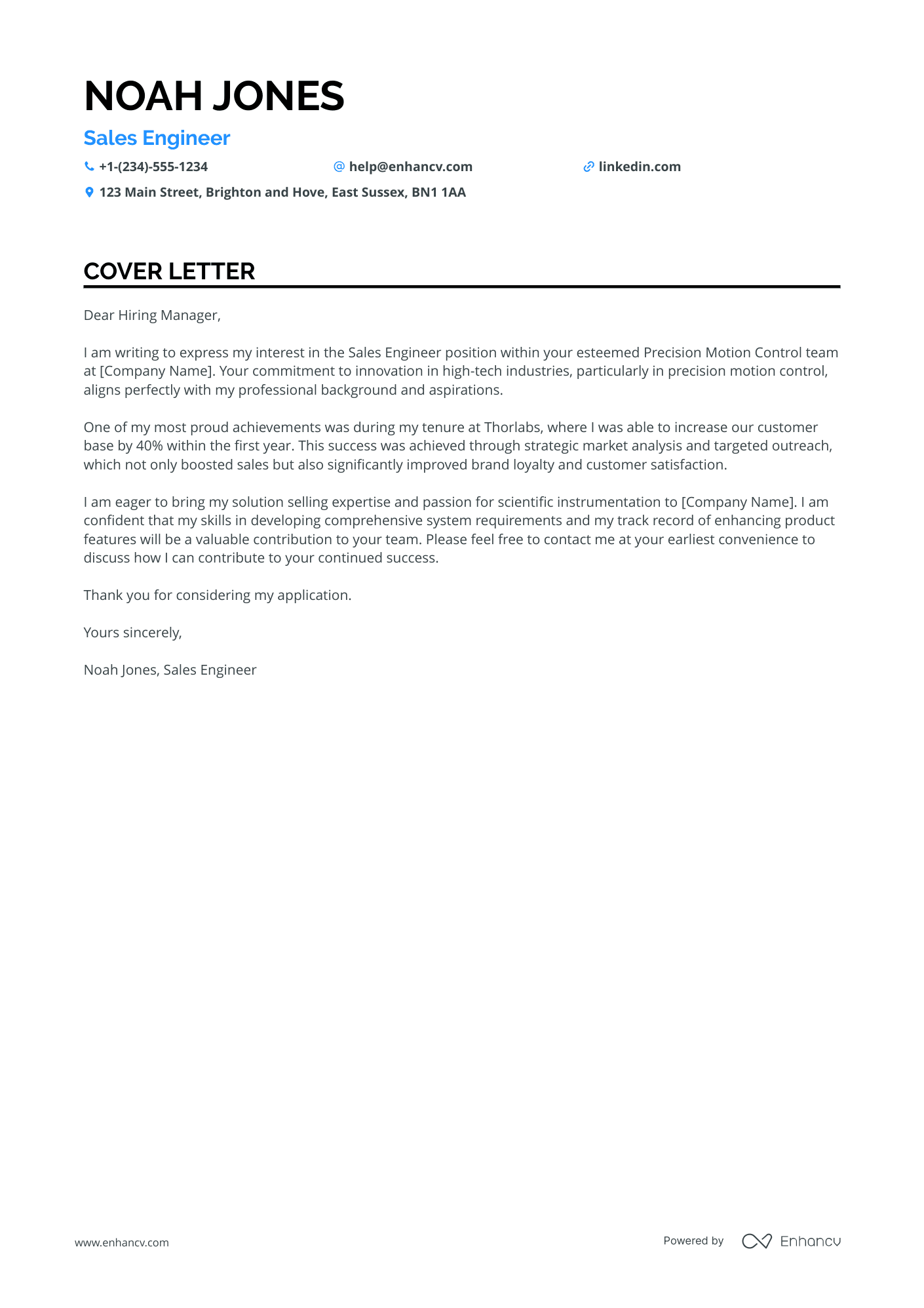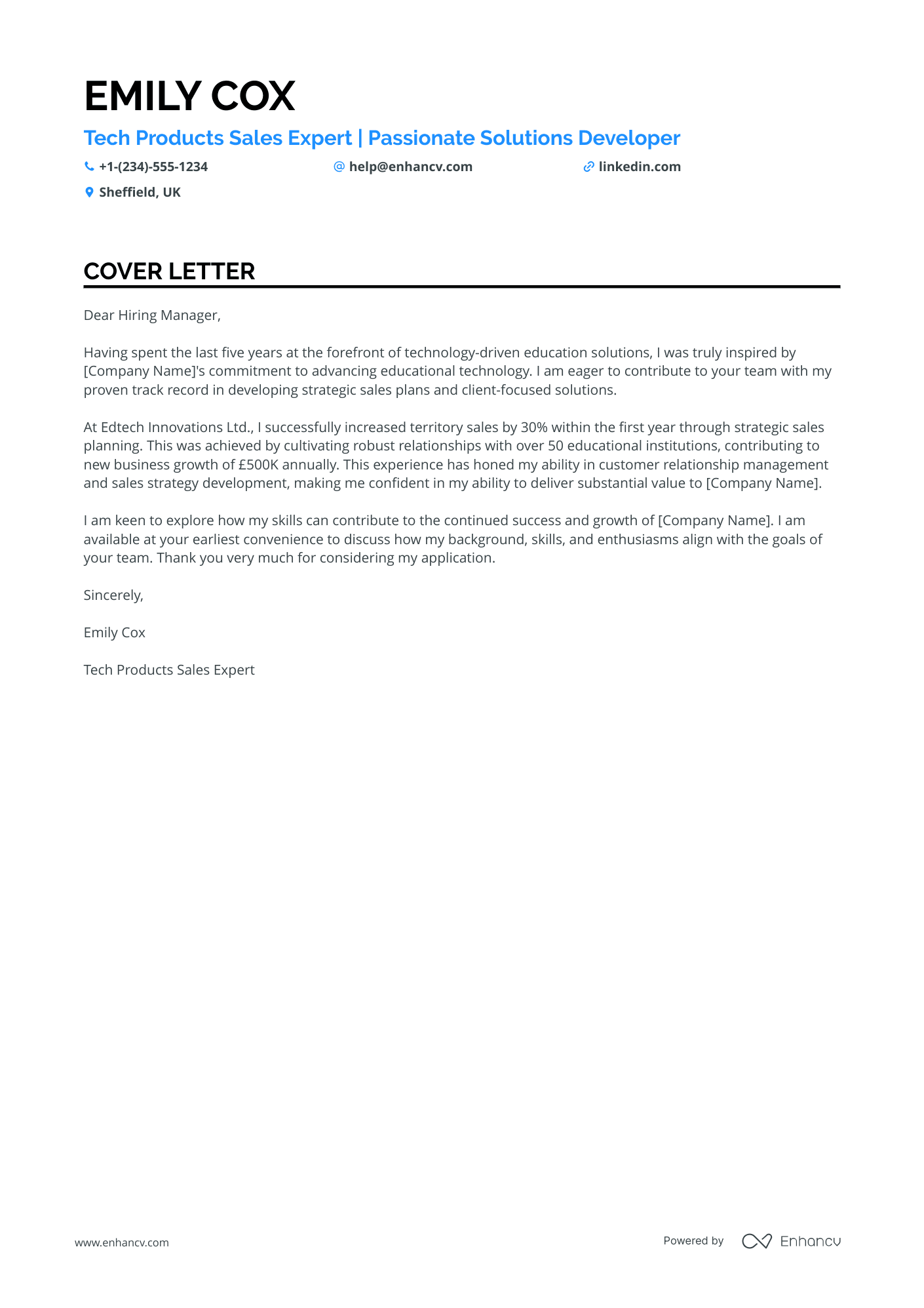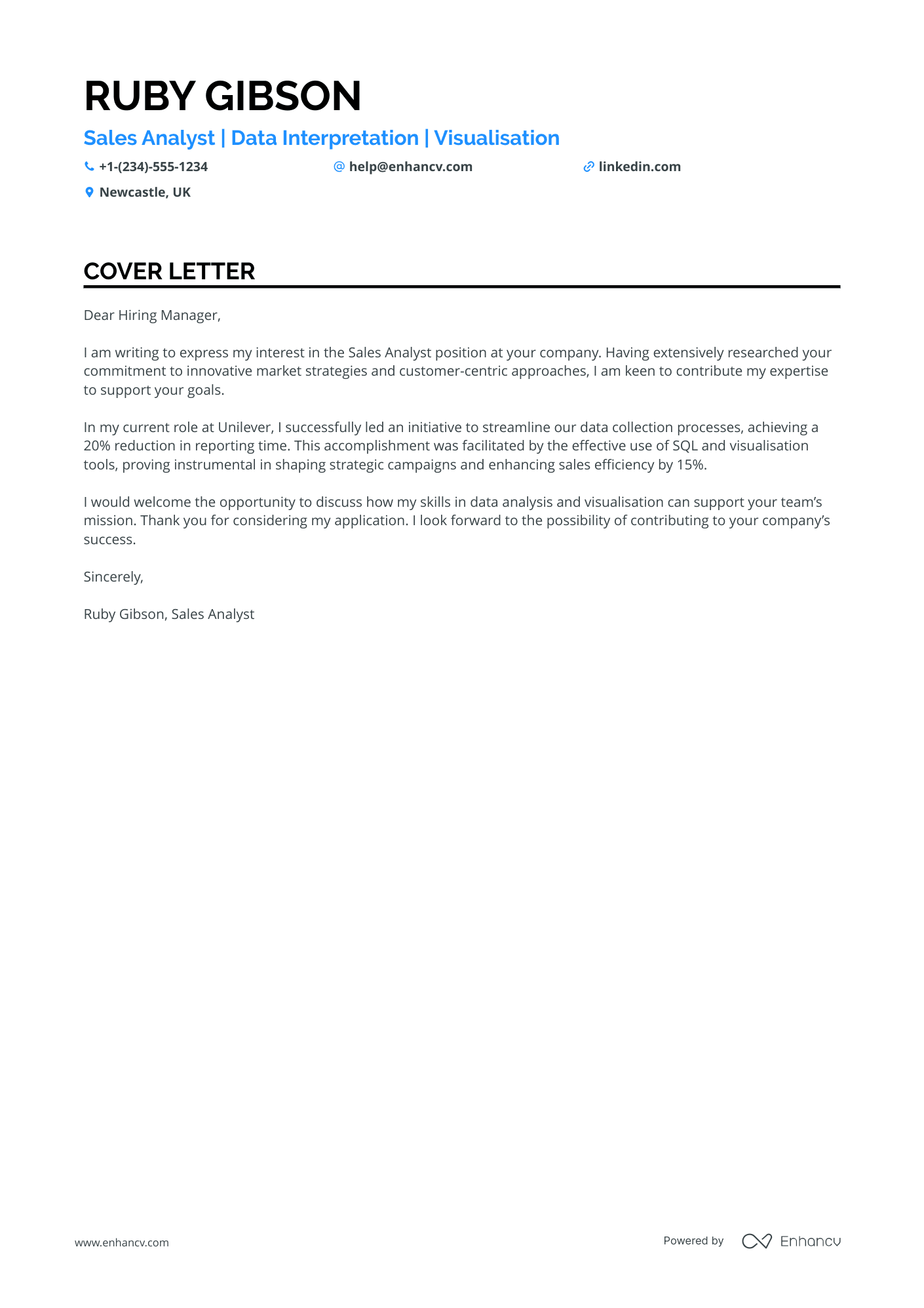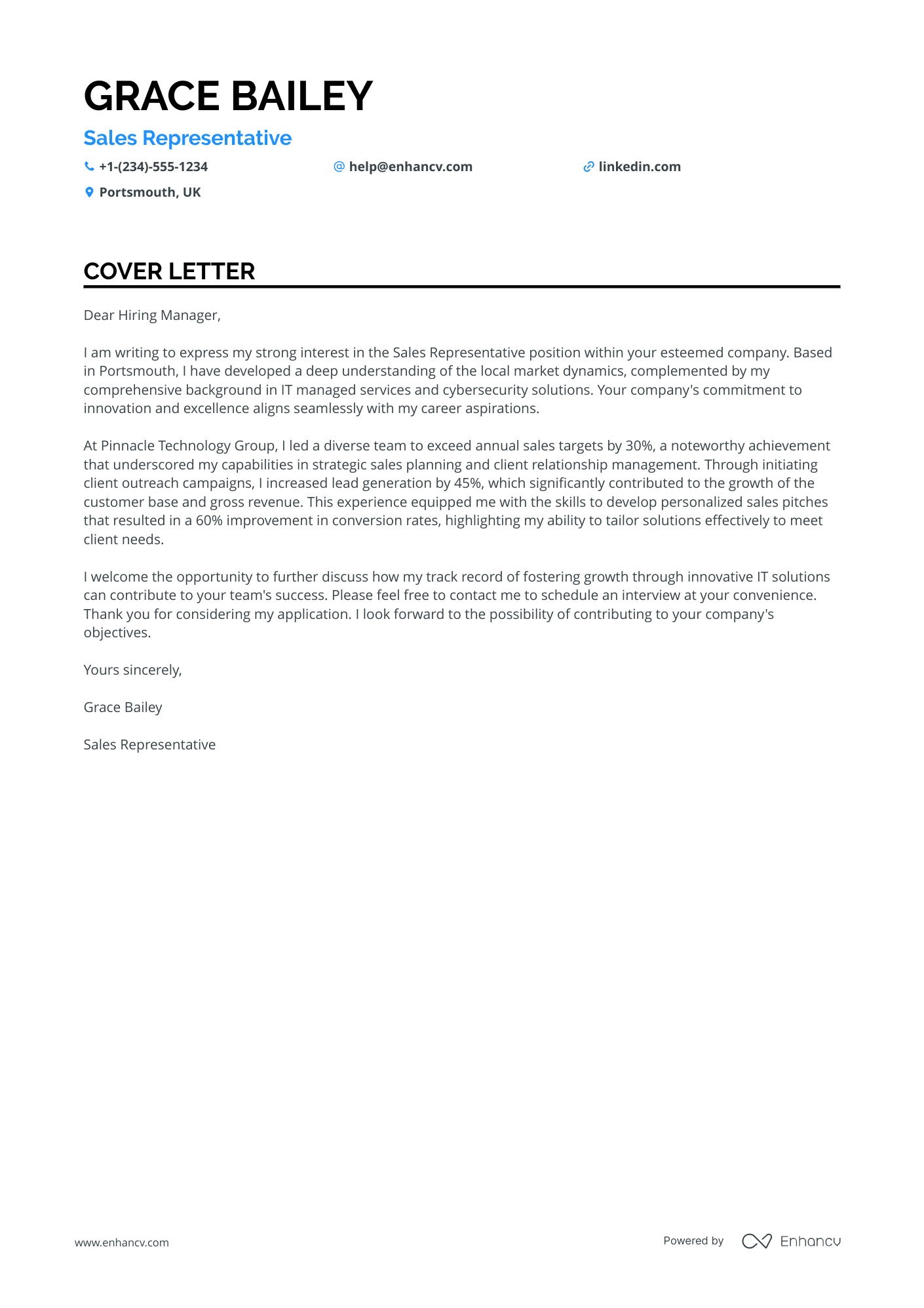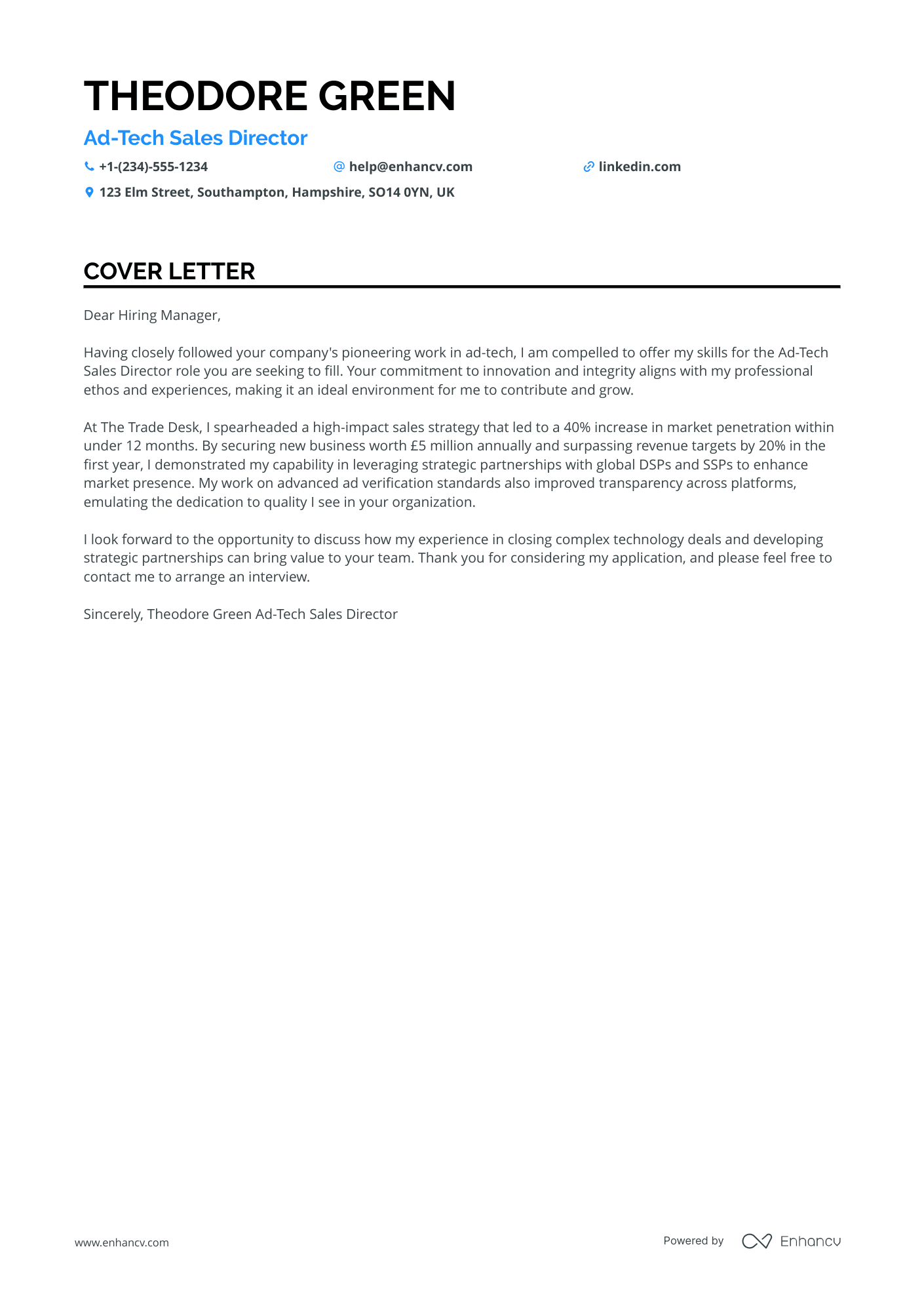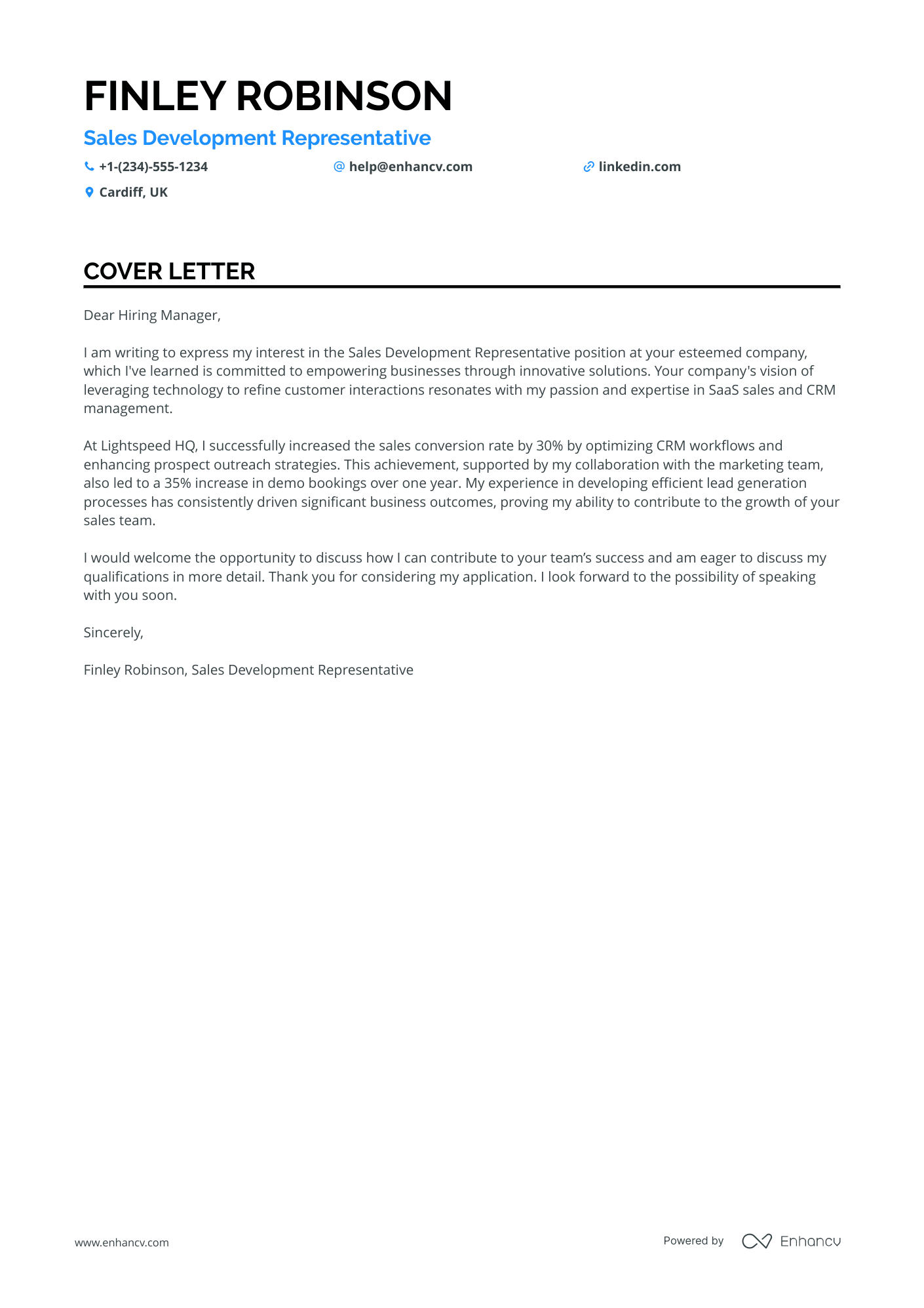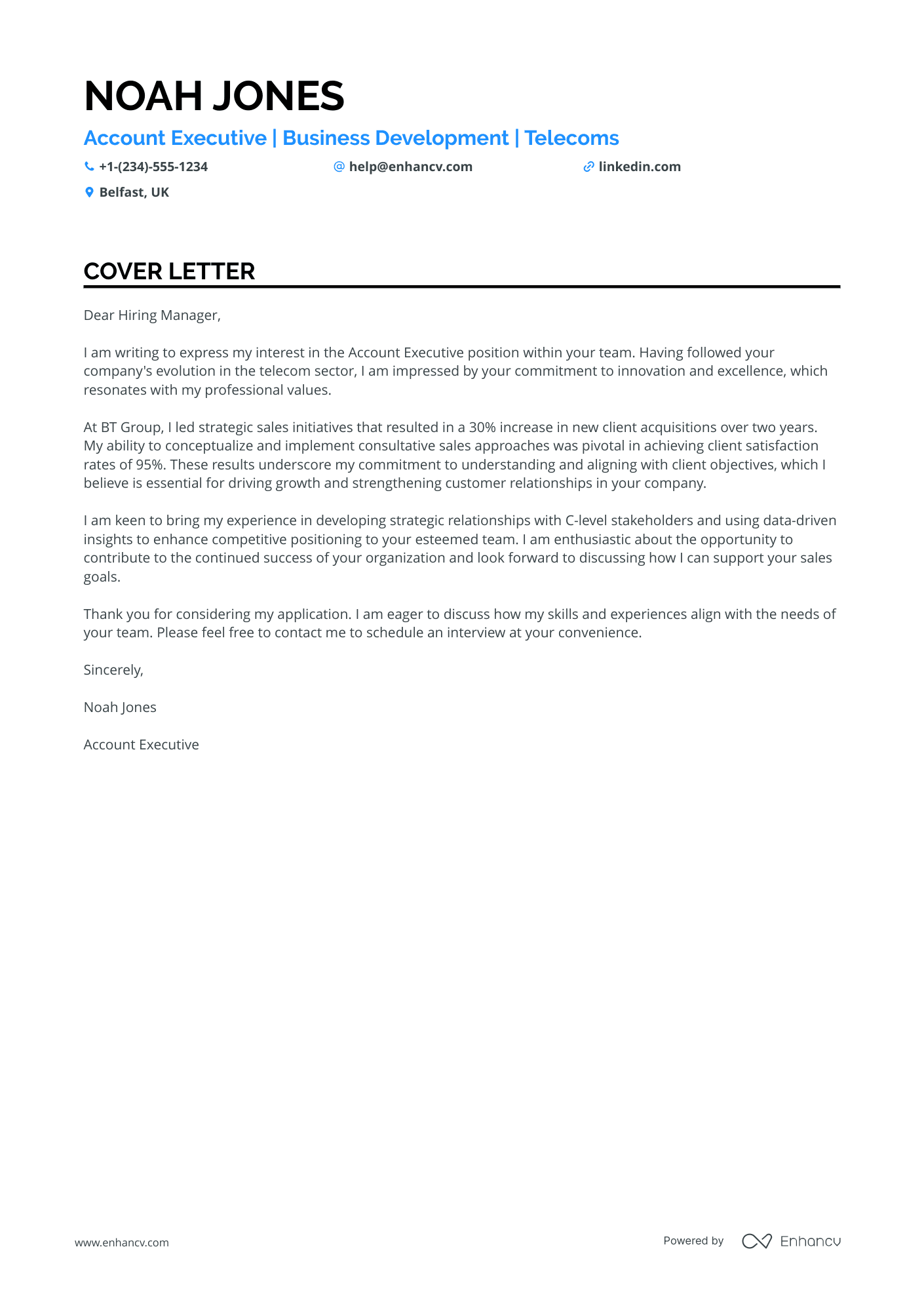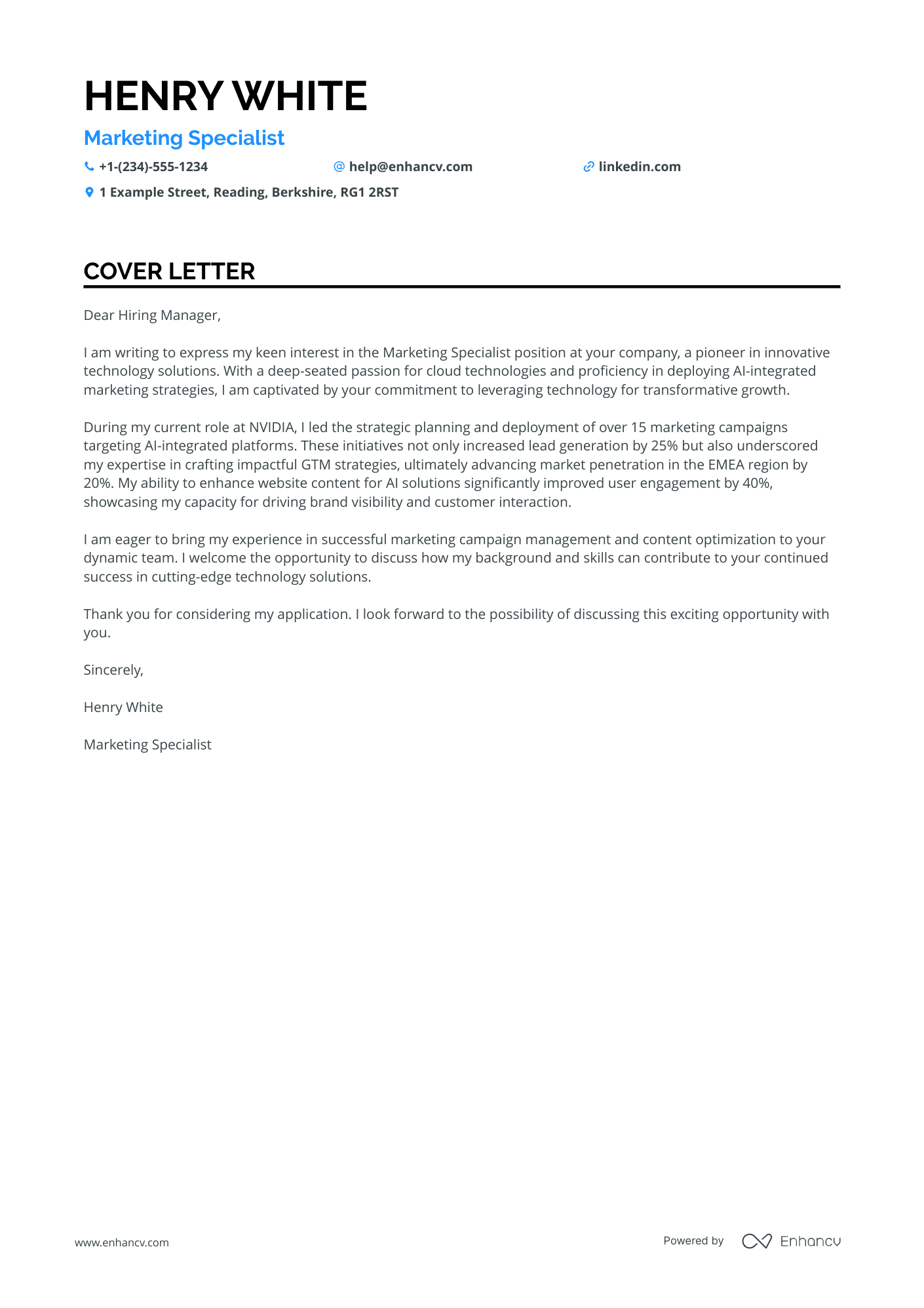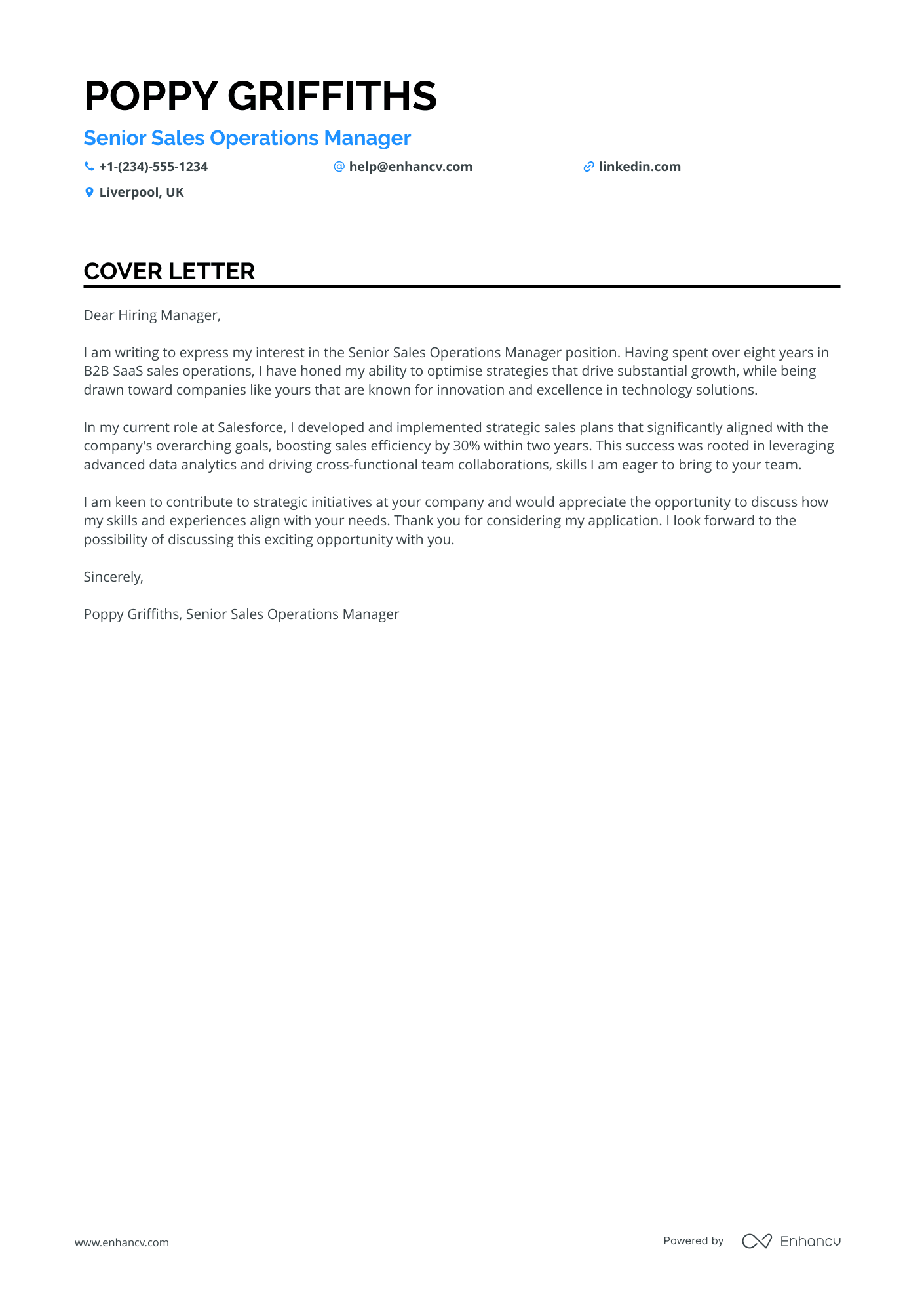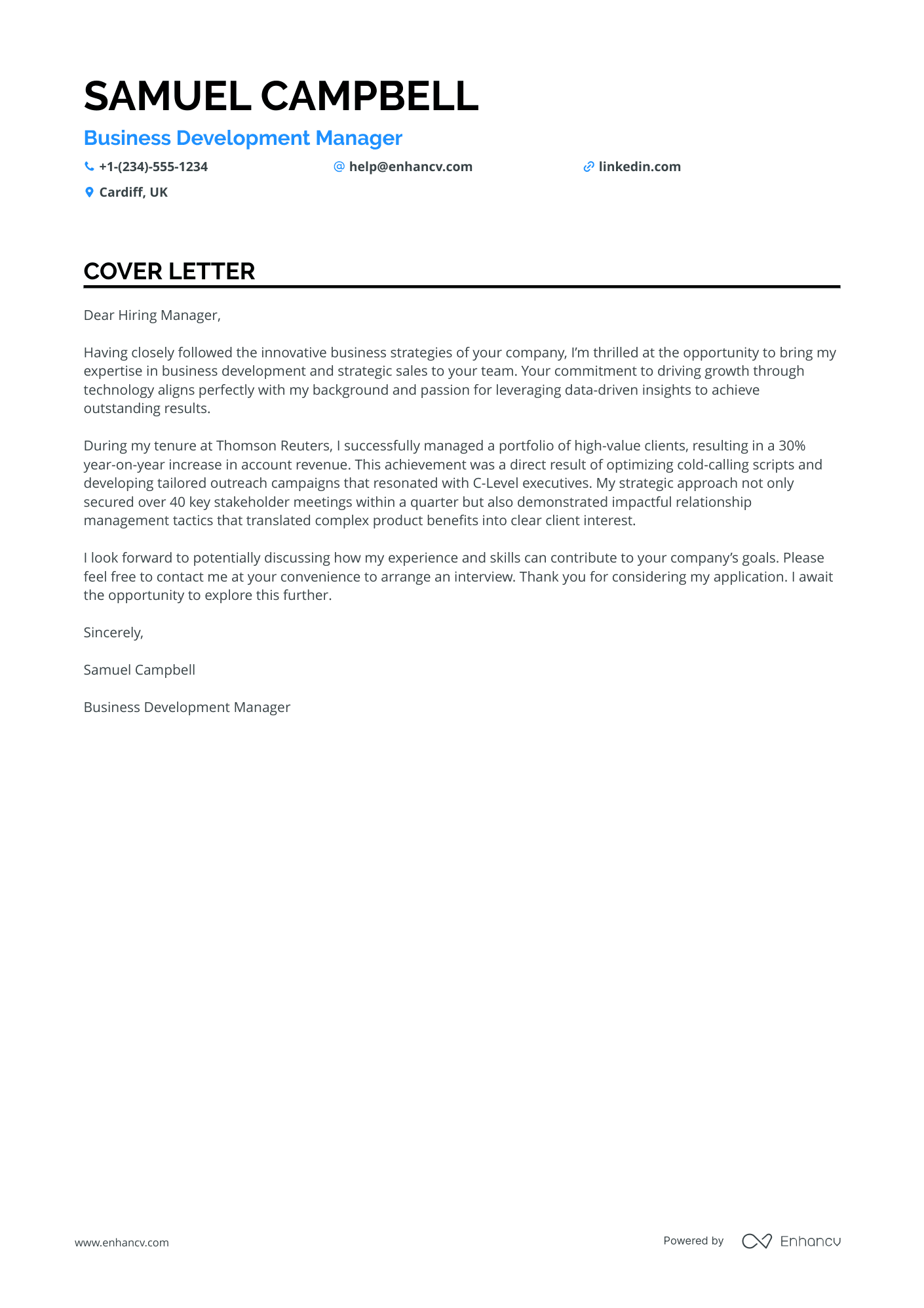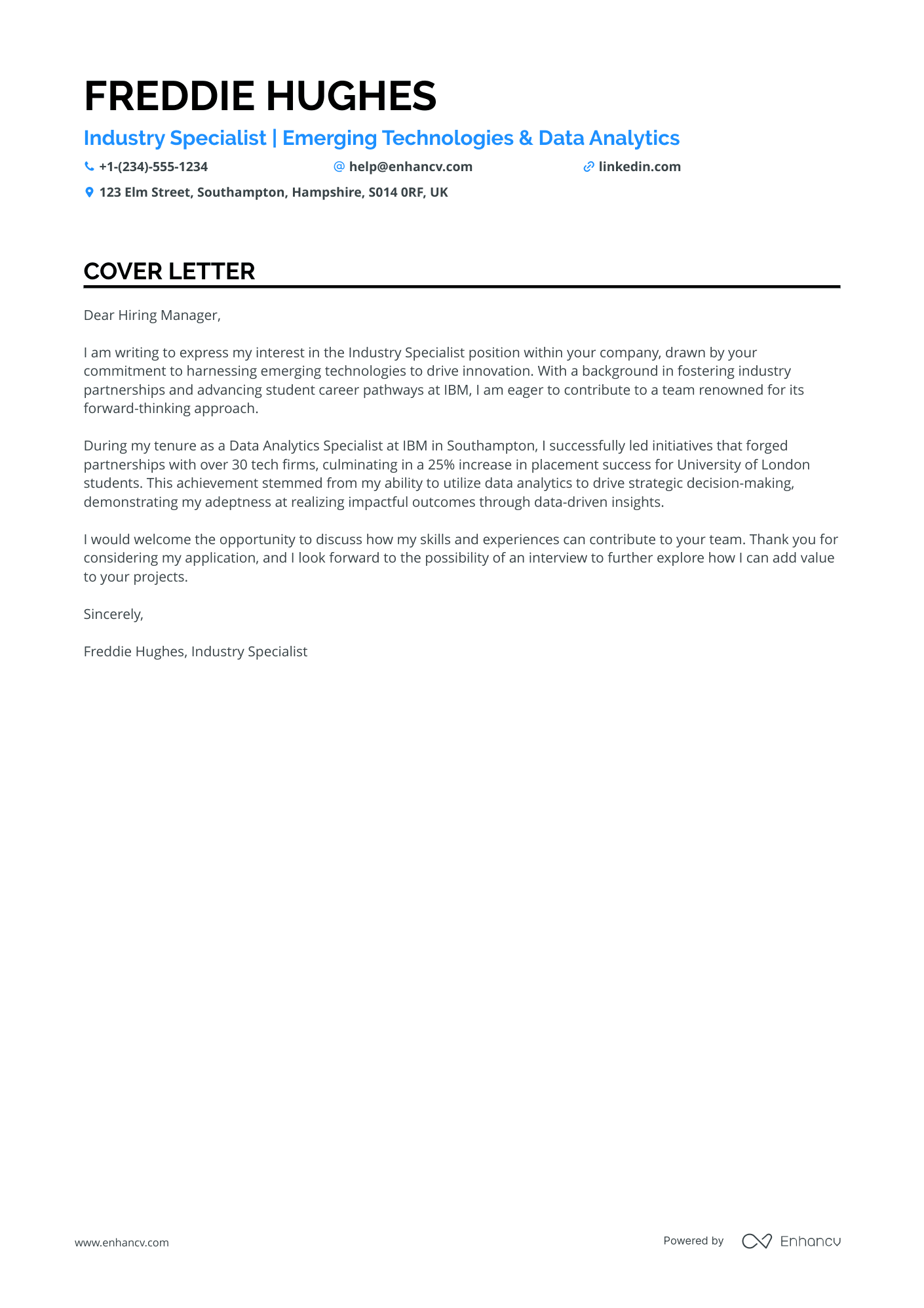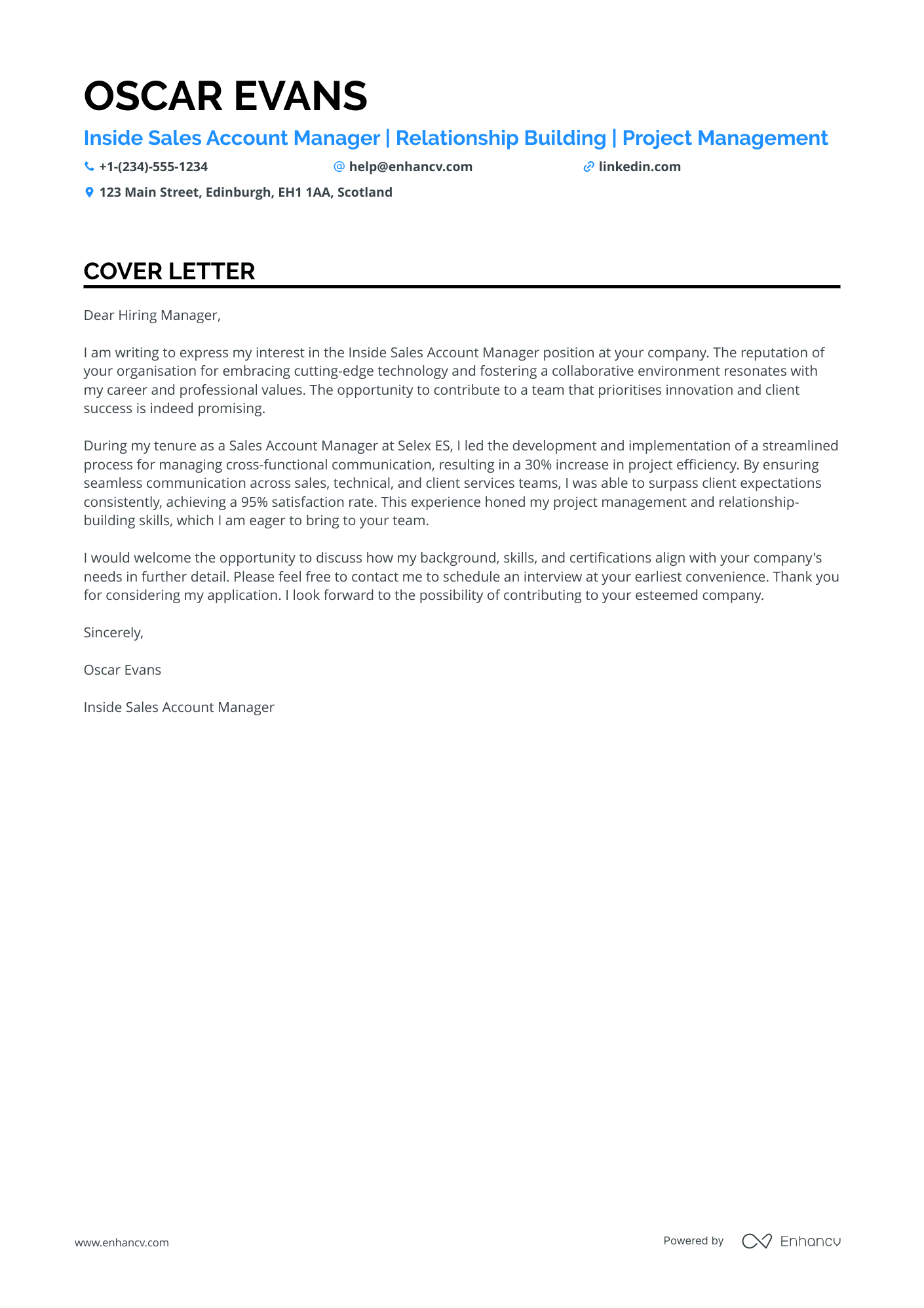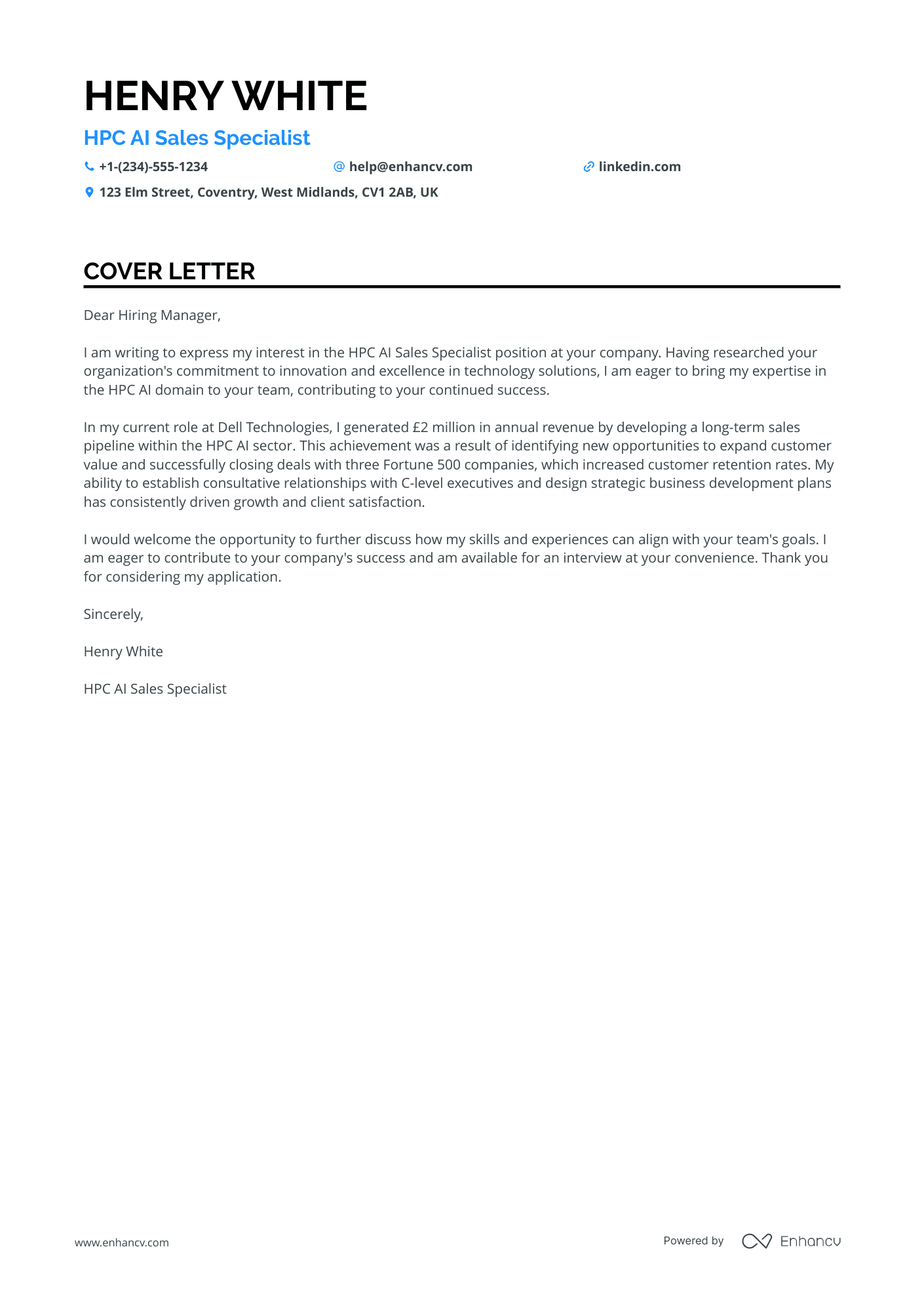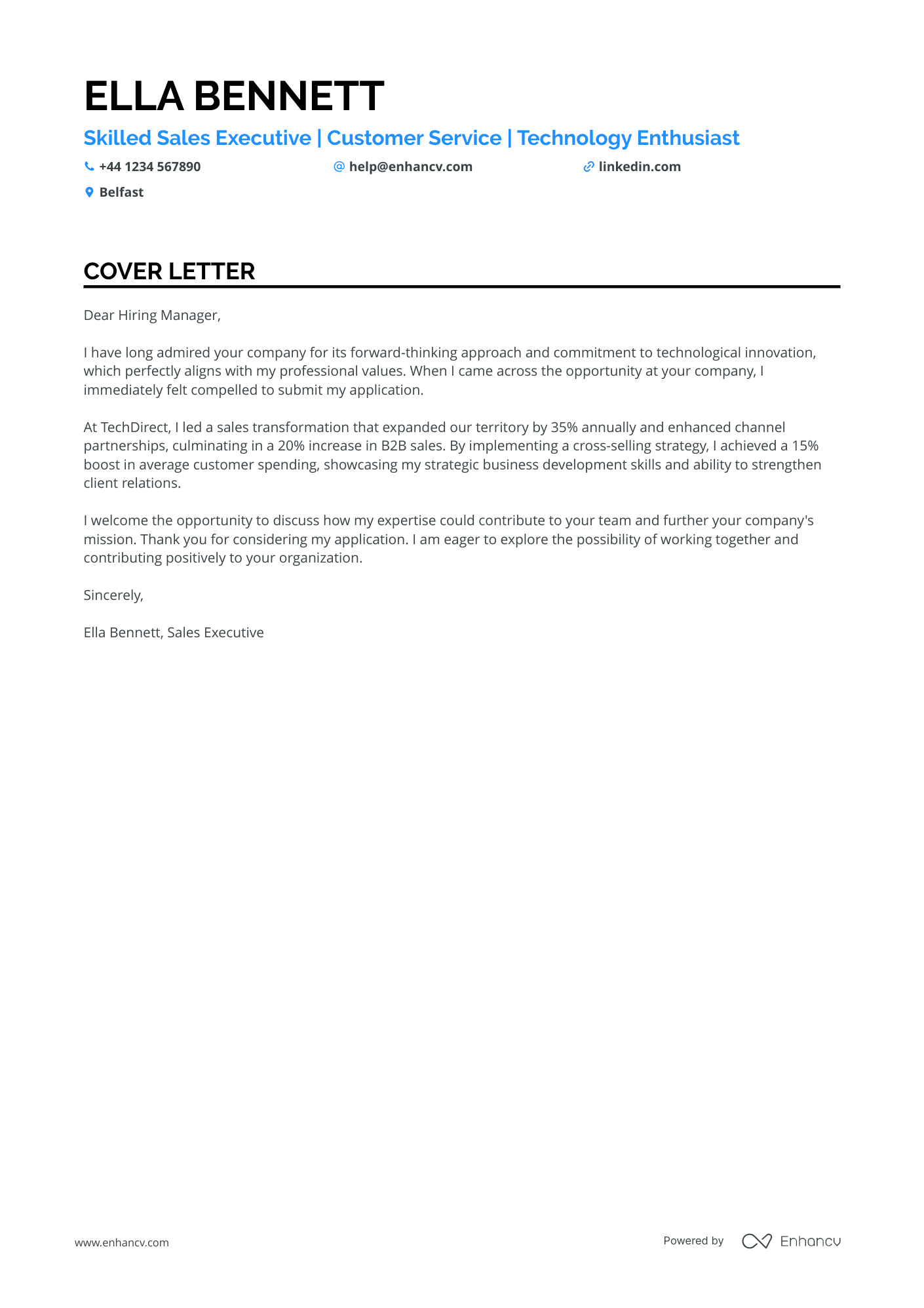Writing a strong cover letter requires close attention to detail, from the tone of voice to avoiding those pesky spelling or grammar mistakes.
Overlooking similar small details can weaken your application.
Many candidates also struggle with how to address the letter, often opting for 'Dear Sir or Madam' when they can’t find the correct contact. This can make your cover letter feel impersonal.
In this guide, we’ll show you how to perfect these crucial elements, ensuring your cover letter is polished and professional without relying on clichés.
Cover letter examples for tech sales
By Experience
Entry-Level Tech Sales Representative
- Specific Achievements: The cover letter highlights measurable achievements such as generating over £500,000 in revenue and increasing lead conversion rates by 30%, showcasing a proven track record of success in sales roles.
- Relevant Experiences: The applicant effectively mentions previous positions that are directly relevant to the sales development role, detailing collaborations and responsibilities that align with the prospective job duties.
- Certifications & Courses: The inclusion of relevant certifications such as the Advanced Sales Certification and CRM System Management Course demonstrates a commitment to continuous learning and expertise in critical areas.
- Language Proficiency: Emphasising language skills like proficiency in German can be particularly advantageous in roles involving international markets or diverse client bases, offering an added layer of value to the employer.
Senior Tech Sales Manager
- Highlighting Project Success: Emphasising a specific project at Tech Solutions that improved process efficiency by 30% helps demonstrate the ability to drive impact and lead successful initiatives.
- Showcasing Technical Expertise: Mentioning proficiency in API product management and Generative AI is critical for the role, illustrating technical competence and relevance to the job.
- Demonstrating Stakeholder Engagement: Providing examples of engaging with executive-level stakeholders to secure project funding reflects strong communication and advocacy skills essential for senior management positions.
- Illustrating Leadership and Strategic Vision: Describing the creation and execution of a product roadmap that led to increased developer adoption highlights strategic thinking and leadership capabilities.
Junior Tech Sales Associate
- Quantifiable Achievements: The cover letter includes specific numerical achievements such as reducing response time by 20% and improving processing efficiency by 25%, which effectively demonstrate the candidate’s impact and skills.
- Relevant Experience: Highlights internships and positions that align closely with the desired role, showcasing relevant skills in sales, marketing, and customer engagement from Redgate Software and HubSpot.
- Technical Proficiency: Emphasises technical skills like SEO, CRM tools, and data analysis, which are crucial for a Sales & Marketing Specialist position.
- Educational Background: Lists a relevant degree in Business Management from a credible institution, which supports the candidate's expertise in the sales and marketing domain.
Mid-Level Tech Sales Representative
- Emphasising the significant revenue growth and strategic relationship-building skills highlights the candidate's capability to drive business outcomes, which is crucial for the role of Inside Sales & Product Specialist.
- Bringing attention to achievements such as the "Top Sales Achiever 2022" award and the "Innovation in Sales Strategy" award solidifies the candidate's credibility and past success in sales strategy execution.
- Reference to proficiency in implementing CRM systems demonstrates technical skills essential for optimising client management processes and enhancing sales pipeline efficiency.
- Mention of engaging with biotechnology innovations aligns well with the industry's distinct needs and shows enthusiasm in staying current with market trends – a vital trait for client advisory roles in a tech-forward sector.
Senior Tech Sales Consultant
- Emphasising the candidate's 10 years of experience in IT solutions sales, particularly in cloud technology, which is critical for demonstrating expertise in the relevant industry.
- Highlighting specific achievements, such as a 30% increase in sales annually and a 95% client retention rate, to provide concrete evidence of past success and value added to previous employers.
- Showcasing advanced certifications and courses, such as "Negotiation Mastery" from Harvard Business School and "Cloud Solutions Architect" by Microsoft, to underscore specialised skills relevant to the role.
- Detailing leadership and teamwork successes, such as managing a sales team to a 45% sales volume increase, reflecting the candidate's aptitude for sales strategy development and team performance enhancement.
Senior Tech Sales Analyst
- Relevant Experience: Highlighting over 5 years of expertise in strategic analysis and performance optimisation in sales incentives showcases a solid foundation for the Senior Sales Incentive Analyst role.
- Technical Proficiency: Emphasising proficiency in tools like Alteryx, Excel, SQL, and experience with data visualisation tools like Power BI and Tableau aligns well with the analytical and technical demands of the role.
- Quantifiable Achievements: Citing specific achievements, such as a 25% increase in sales efficiency or a 40% reduction in reporting time, provides concrete evidence of impact and effectiveness.
- Leadership and Communication: Detailing experience in directing teams, resolving priorities, and enhancing decision-making through compelling presentations underlines strong leadership and communication skills essential for driving strategic initiatives.
By Role
Tech Sales Coordinator
- Specific Skills Highlight: Emphasising proficiency in CargoWise, a key software within the logistics industry, demonstrates the ability to manage and optimise cargo and operational systems effectively.
- Demonstrable Achievements: Including quantifiable impacts like a 25% increase in client satisfaction and a 12% boost in net profit showcases the ability to drive significant business improvements.
- Relevant Experience: Detailing a strong history of positions within major logistics firms such as DHL and Kuehne+Nagel, coupled with tangible results from those roles, provides credibility and expertise in the field.
- Education and Certifications: Highlighting advanced degrees and specific certifications in logistics and supply chain management underscores a strong foundational knowledge and commitment to professional development.
Tech Sales Engineer
- Emphasising Certifications: Highlighting specialised certifications such as the "Advanced Motion Control Systems" from MIT Professional Education adds credibility and showcases expertise relevant to high-tech industries.
- Detailing Experience with Concrete Results: Discussing prior roles with quantifiable achievements, such as a 25% market presence expansion or a 40% increase in customer base, illustrates success and an ability to drive growth.
- Showcasing Passion and Engagement: Including passions related to the field, like "Photonics Technology," demonstrates ongoing personal interest and a commitment to staying updated with industry trends, enhancing appeal to potential employers.
- Highlighting Interpersonal and Technical Skills: Stressing skills such as solution selling, technical advice, and customer relations indicates a strong blend of interpersonal abilities and technical knowledge vital for a Sales Engineer role.
Tech Sales Consultant
- Relevant Experience Highlighted: Emily effectively showcases her extensive experience in sales, specifically within the education technology sector, making it immediately clear to prospective employers her alignment with technological sales roles.
- Key Achievements Emphasised: By listing significant achievements such as "Top Sales Performer 2022" and the success of new product launches, Emily demonstrates her ability to exceed targets and deliver impactful results, which are critical for sales roles.
- Skill Proficiency and Certifications: The inclusion of specific skills like "Sales Strategy Development" and certifications such as the "Customer Relationship Management Certification" underscores Emily's expertise and commitment to professional growth, which are important qualifiers for a tech sales expert role.
- Passion for Industry: Emily’s passion for "Innovative Education Technology" indicates not only her alignment with the sector’s values but also her motivation to drive change and improvement, which can be very compelling for employers looking for dedicated professionals.
Tech Sales Analyst
- Relevant Experience: The cover letter highlights over 3 years of experience in sales data analysis, which is directly applicable to the Sales Analyst role, increasing its effectiveness.
- Technical Skills: Emphasising proficiency in SQL and data visualisation tools, the writer demonstrates essential skills needed for interpreting large datasets and creating insightful reports.
- Achievements: Specific accomplishments, such as increasing sales efficiency by 15% and reducing reporting time by 20%, offer tangible evidence of the candidate's impact and capability in previous roles.
- Education and Professional Development: The inclusion of a Master's degree in Data Science and advanced courses in data visualisation and SQL fortify the candidate's technical expertise and commitment to ongoing learning.
Tech Sales Specialist in Cybersecurity
- Industry-Relevant Experience: Grace Bailey has 8 years of experience in IT managed services and cybersecurity solutions, showing her depth of knowledge and capability in the sector.
- Demonstrated Sales Success: Her role as Sales Manager at Pinnacle Technology Group highlights leadership in exceeding sales targets by 30%, proving her effectiveness in driving growth.
- Skills and Certifications: Advanced proficiencies in sales prospecting and strategic sales planning are complemented by a Cybersecurity Sales Specialist course completed with IBM Skills Academy.
- Client-Centric Approach: Achievements like a 35% increase in client retention through customised packages and workshops showcase her focus on client relationships and satisfaction.
Tech Sales Director
- Highlighting specialised certifications such as the Certified Digital Ad Sales Expert and Connected TV Advertising Specialist demonstrates deep knowledge and credibility in the ad-tech industry, particularly valuable for a role focused on technology-driven sales and partnerships.
- Emphasising the achievement of generating over £20 million in new client revenue showcases the candidate's proven track record in driving significant business growth, an essential aspect for a Sales Director role.
- Showcasing strategic partnerships and business development skills, such as those gained from cross-departmental collaborations and launching high-impact sales strategies, aligns with the core responsibilities of managing and expanding key business relationships.
- The focus on skills like Ad Verification and Compliance highlights the candidate's attention to industry standards and trust, necessary for ensuring transparency and integrity in ad transactions.
Tech Sales Executive in Software Services
- Highlighting specific achievements such as a 25% increase in sales retention and optimising CRM processes demonstrates measurable success and relevant expertise in sales and CRM management.
- Incorporating past roles in both sales development and customer success shows a well-rounded understanding of client relationships, crucial for a role focusing on sales development and account management.
- Mentioning certifications like "Advanced Prospecting Strategies" by HubSpot Academy and "Professional Selling Skills" by Dale Carnegie underlines the candidate's continuous professional development in specialised sales techniques.
- Emphasising a cross-functional collaboration highlights the ability to work effectively within and across teams, an important aspect for roles that require coordination with marketing and other departments.
Tech Sales Account Manager
- Highlighting consistent achievement of exceeding sales targets and growth metrics through various roles strongly positions the candidate's capability in achieving measurable success in sales and business development.
- Emphasising proficiency in consultative selling and data-driven insights aligns well with the role's requirements for strategic relationship building and tailored solution development in telecom environments.
- Showcasing collaboration with global and cross-regional teams underlines the candidate's ability to enhance international sales strategies and their adaptability to global market dynamics.
- Including relevant courses and certifications, such as "Data-Driven Decision Making" from Harvard Online, reinforces the candidate's ability to transform data into actionable business insights.
Tech Sales Specialist in Cloud Computing
- Highlighting specific certifications, such as "AI in Marketing Certification" from AI Business School, emphasises specialised knowledge in integrating AI technologies into marketing strategies, which is crucial for a Marketing Specialist focusing on AI and Cloud Computing.
- Emphasising impactful achievements like the "Top Lead Generator 2022" underscores the tangible results of surpassing lead generation targets, showcasing the candidate's ability to drive growth through innovative marketing strategies.
- Detailing technical skills, particularly in tools like Salesforce Marketing Cloud, affirms proficiency in essential marketing platforms and data analysis processes, highly valued traits in strategic marketing roles.
- Mentioning international collaborations and market penetration success, such as the 20% improvement within the EMEA region, demonstrates competency in strategic global marketing, an asset for roles involving international market engagement.
Tech Sales Operations Manager
- Professional Experience: Highlighting over 8 years of experience in B2B SaaS sales operations, the cover letter effectively establishes credibility and showcases significant achievements in optimising sales strategies, emphasising the applicant's capability to drive growth.
- Specific Achievements: Detailing precise accomplishments such as a 30% increase in sales efficiency and a 40% improvement in data accuracy showcases not only technical proficiency but also quantifiable success in past roles.
- Relevant Certifications & Education: Including courses like 'Sales Operations Science' from HubSpot Academy underscores specialised knowledge, beneficial for a role focused on enhancing sales process management.
- Skills Alignment: The letter aligns skills such as 'Process Optimisation' and 'Cross-Functional Leadership' with the role, indicating the candidate's suitability for tasks involving team collaboration and process enhancement.
Tech Sales Business Development Manager
- Highlighting Quantifiable Achievements: The cover letter effectively underscores Samuel's accomplishments, such as closing 50 new B2B leads in a quarter, thus demonstrating the ability to exceed sales targets and contribute to significant revenue growth.
- Emphasising Leadership and Innovation: Mentioning being recognised for 'Sales Innovation of the Year' illustrates Samuel’s ability to create impactful sales strategies, an essential quality for a Business Development Manager.
- Communicating Versatility and Skills: The cover letter details a range of skills and experiences, from strategic sales planning and market analysis to client relationship management, showcasing a well-rounded candidate suitable for a managerial position.
- Education and Continuous Learning: Including educational background and professional courses, like "Advanced B2B Sales Strategies", highlights a commitment to professional growth and expertise, reinforcing credibility in business development.
Tech Sales Specialist in Data Analytics
- Highlighting Relevant Experience: Emphasise roles like 'Data Analytics Specialist' at IBM, which directly align with the role of Industry Specialist by showcasing experience in partnership establishment and programme development.
- Specific Achievements and Metrics: Mention quantifiable achievements such as a 20% improvement in placements or a 25% enhancement in placement success, which underscore effectiveness and results-oriented approaches.
- Showcasing Education and Continuous Learning: Include completed courses like 'Data Science Specialisation' and certifications that demonstrate ongoing commitment to professional development and expertise in emerging technologies and data analytics.
- Soft Skills and Industry Engagement: Highlight public speaking, relationship management, and event planning skills, which are crucial for roles involving collaboration and communication with industry stakeholders.
Tech Sales Project Manager
- Highlighting measurable achievements such as increasing sales by 30% and boosting client satisfaction to 95% demonstrates the candidate's proven track record in achieving substantial results, which is crucial for a sales role.
- Emphasising industry-relevant experience, including leadership roles in major companies like Selex ES, Thales Group, and BAE Systems, showcases the candidate's extensive expertise in managing complex sales and client service operations.
- Including certifications such as "Project Management Professional (PMP)" indicates proficiency in essential project management skills, which are vital for successfully handling multiple sales accounts and ensuring efficient project execution.
- Mentioning skills in "Solution Selling" and "Cross-Functional Team Collaboration" illustrates the applicant's ability to tailor solutions to client needs and effectively work with different departments, which are key competencies for account management roles.
Tech Sales Specialist in AI Solutions
- Emphasising Track Record: The cover letter effectively highlights Henry White's impressive track record in driving significant sales revenue and expanding market share in the HPC AI sector, which is crucial for gaining credibility in sales roles.
- Showcasing Key Skills: Skills such as consultative selling, business development, and C-Level engagement are prominently mentioned, aligning well with the requirements of an HPC AI Sales Specialist role.
- Certifications and Courses: Referring to specialised courses such as HPC Platforms and Applications and AI Solution Selling Techniques demonstrates continued professional development and expertise in niche areas.
- Achievement Highlights: Specific achievements, like being named Top Sales Performer of the Year, reinforce the candidate's success and ability to excel in sales targets, making them highly appealing to potential employers.
Tech Sales cover letter example
Ella Bennett
Belfast
+44 1234 567890
help@enhancv.com
- Highlight specific achievements and metrics: In the sales role, mentioning quantifiable accomplishments, such as a 35% territory expansion and a 20% increase in B2B sales, demonstrates your effectiveness and provides concrete evidence of your capabilities.
- Align your experience with the company's mission: Emphasizing how the company's forward-thinking approach and technological innovation align with your values can help you stand out as a culturally fitting candidate.
- Showcase strategic skills: By detailing a successful cross-selling strategy that increased customer spending by 15%, you effectively present your ability to devise and implement strategies that contribute to business growth.
Importance of cover letters in the United Kingdom
Cover letters are a crucial part of your application, offering additional details beyond your CV.
Here’s why they’re essential:
- Supporting your CV: Now's your opportunity to provide some context for your experience, with more information on your key achievements and how your profile could benefit the position and organisation to which you're applying.
- Showcases your character: Taking the time to write a cover letter demonstrates that you’re proactive, organised, ambitious, and genuinely interested in the role.
- Reflects your career goals: Use the cover letter to outline your long-term career career aspirations and how this role aligns with your broader plans.
What UK employers expect from a cover letter
Want to make an excellent first impression on your UK employers with your cover letter?
Here are three handy tips and tricks to keep in mind when creating yours:
- Take the time to research: Invest in learning about the company and role by exploring their website, social media, and doing a thorough Google search. Focus on the products and services they offer, as well as awards and industry recognitions.
- Focus on the company's values: Refer back to your research and to uncover what the company believes in. Integrate those values into your cover letter by explaining how you embody them. For example, if they value diligence, highlight how you’ve consistently met tight deadlines or successfully managed heavy workloads.
- Align your skills with the job requirements: Read the job advert carefully and identify the most sought-after skills. Select the top three skills that you can substantiate with your most noteworthy achievements, to demonstrate your expertise in those areas.
How to format a tech sales cover letter
Keep in mind that your cover letter is intended for the recruiters' eyes only, not for the Applicant Tracking Systems (ATS) software that aligns your job application with role requirements. That's why it's essential to concentrate on the quality of the content and presentation to make a memorable first impression.
Don’t forget to include:
- Your address and contact details
- The employer’s name and address
- Date
- Greeting
- Introductory paragraph
- Body paragraphs
- Closing paragraph
- Sign-off and signature
Now for some formatting tips and tricks: choose modern fonts such as Rubik, Volkhov, or Raleway instead of traditional ones like Arial. Keep your cover letter single-spaced with margins of around 1-inch (2.5 cm). To maintain a professional and consistent look, ensure that both your CV and cover letter use the same font style.
Lastly, always send your cover letter as a PDF to preserve its formatting and prevent any edits once it's sent, ensuring your design and layout remain intact for the recruiters.
How to write your tech sales cover letter salutation
Imagine you're a hiring manager reading through countless cover letters—which would catch your attention: being addressed directly by name, or reading 'Dear Sir or Madam'?
The first option shows you've made the effort to learn about the company and the role.
To find the hiring manager's name, try LinkedIn, check the company's website, or even reach out to the organisation on social media.
How to write your tech sales cover letter intro
Employers do want someone who not only delivers results but does so with enthusiasm.
Thus, a great way to start your cover letter is by showing how your personal passions align with the role.
Highlight one or two aspects of the job description that resonate with you, and explain why this makes you a perfect fit for the company and its culture.
How to write your tech sales cover letter body
Your cover letter body is the most spacious and vital part of this document—it highlights your true value and the impact you can bring as a candidate.
Remember, your cover letter serves a different purpose to your CV. Here, you need to show your skills in context by telling the story of one significant achievement, hinting at how you’ll help your future employer achieve their goals.
So, when writing your cover letter body:
- Use concrete achievements to demonstrate your personality and impact.
- Support your achievements with quantifiable data and metrics.
- Tell the story of a successful project you’ve worked on and explain how you contributed to the outcome.
- Highlight both hard and soft skills to make your story more engaging.
- Focus on skills that are most relevant to the role and align with the company’s needs.
How to write a closing paragraph
You’ve written a brilliant cover letter so far—so don’t undermine it at the very end.
If you think signing off with a polite 'Kind regards' or 'I look forward to hearing from you' will make a strong impression, think again.
A better approach is to make a tangible promise—one that reflects both personal and professional growth—and demonstrates your value to the recruiters.
Alternatively, encourage the hiring managers by asking when you might expect to hear back from them.
Conclusion
Your cover letter is an opportunity to showcase your personality and skills to potential employers. Start by addressing the hiring manager by name and tailoring your content to reflect the role’s requirements.
Include a specific example of your greatest achievement to illustrate your suitability for the position, while also expressing your enthusiasm for the company. Remember to format your letter professionally, ensuring it aligns seamlessly with your CV.
